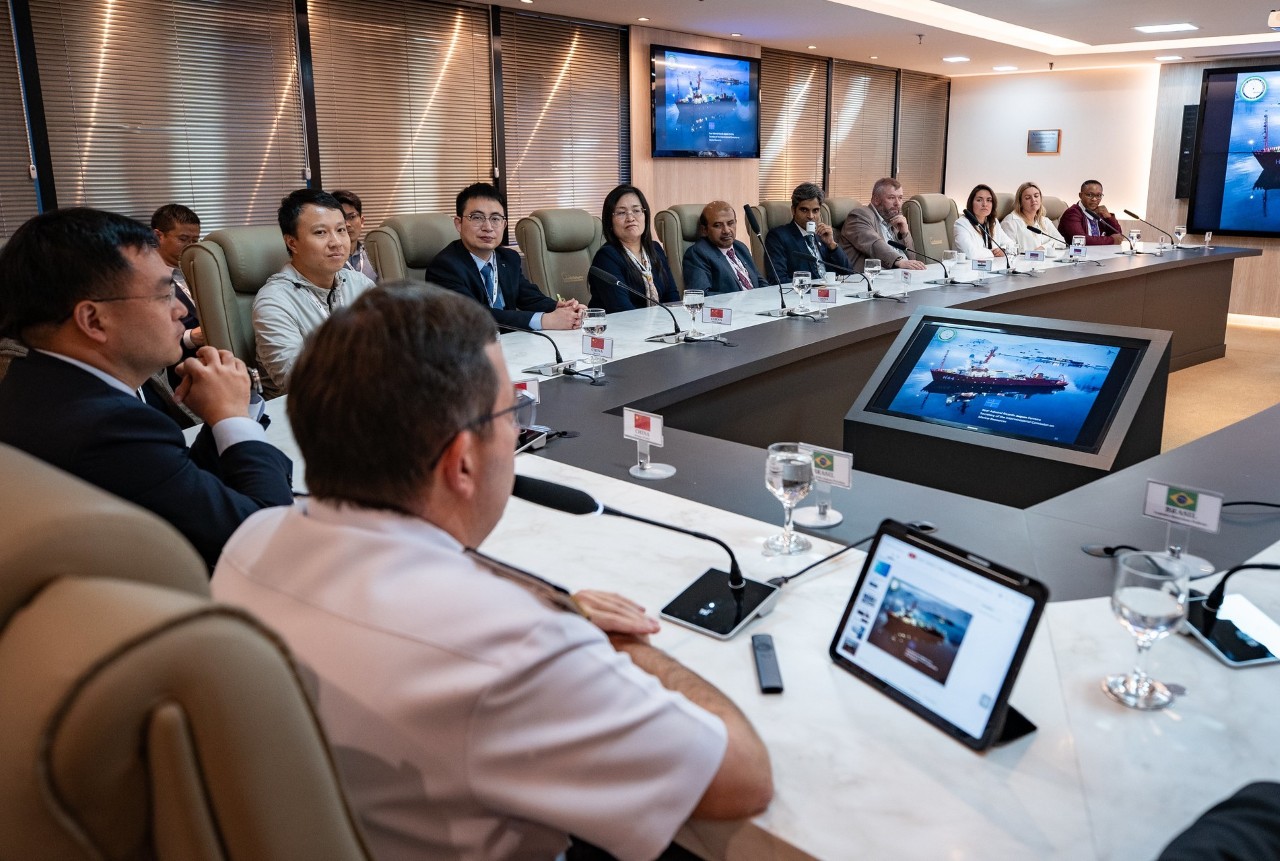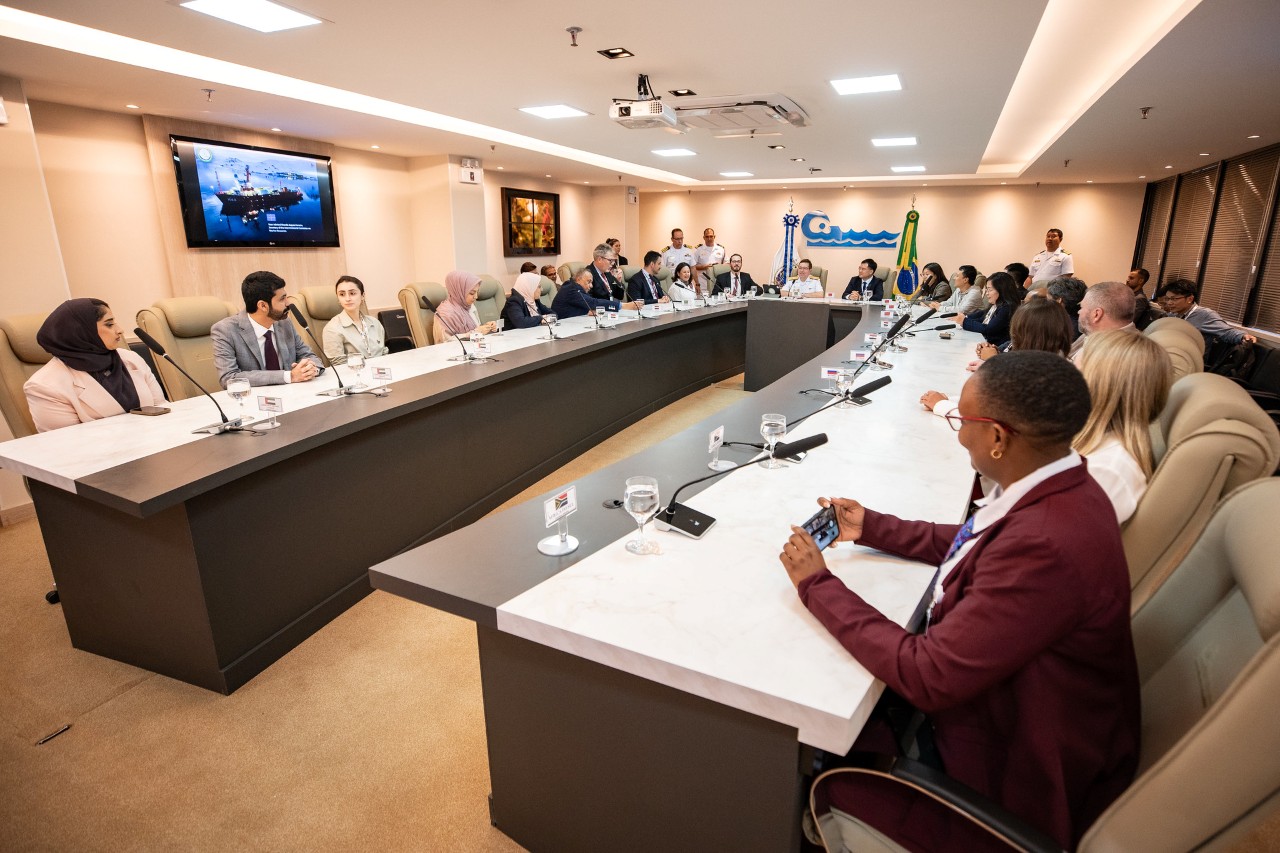Scientific cooperation among BRICS countries strengthens oceanic and polar research
Brasil leads 7th Meeting of BRICS Working Group on Polar and Ocean Science and Technology

On May 21 and 22, the Ministry of Science, Technology and Innovation hosted the 7th Meeting of the BRICS Working Group on Polar and Ocean Science and Technology, bringing together representatives from India, Russia, South Africa, China, Egypt, and the United Arab Emirates. The event featured a dynamic exchange of experiences and knowledge, reaffirming the countries’ shared commitment to science as a key tool for tackling climate challenges and advancing sustainable development.
On the first day of the meeting, participating countries shared key initiatives related to monitoring oceanic and polar regions, with a focus on meteorology, biology, flux measurements, climate forecasting, and disaster prevention. Participants described the discussions as productive and highlighted a strong mutual interest in the solutions being developed across the member nations.
"It was a day of many exchanges. It became clear how interested the countries are in each other’s work. The level of interest each country showed in the others’ work was evident—it was a true moment of scientific and technological collaboration," emphasized Leandro Pedron, Director of the Department of Thematic Programs at the Ministry of Science, Technology and Innovation.
Science as a collective solution
The BRICS Working Group on Polar and Ocean Science and Technology serves as a strategic platform to strengthen multilateral cooperation in research, technological development, capacity building, and data sharing. The common agenda becomes even more urgent in the face of growing challenges posed by climate change and the degradation of marine and polar ecosystems.
Pedron explained that since 2018, the group has been advancing discussions in five key areas: oceanic and atmospheric modeling for disaster forecasting, polar research in high-latitude regions including Antarctica, marine biodiversity, seabed processes, and coastal and estuarine ecosystems.
In addition to advancing scientific understanding, the group seeks to develop cooperative frameworks capable of anticipating extreme events—like the recent disasters that struck Rio Grande do Sul in Brasil and affected other BRICS countries.
"When we understand that our connection with the ocean is the foundation for sustaining life on Earth, it becomes evident how essential it is to invest in science. And this can only be done through a great deal of cooperation, because it's costly, extremely complex research that requires large infrastructures and highly qualified professionals," Pedron stressed.
Shared challenges, joint solutions
The challenges faced by the countries are similar: lack of real-time data collection, the need to improve forecasting and modeling systems, and the strengthening of technical capacities. India, China, and Russia, for example, reported limitations in their ocean monitoring networks, underscoring the importance of enhancing partnerships within the BRICS framework.
"Scientific cooperation is not just desirable, it is essential. Science as a means, science as a solution. Brasil has played a very important leadership role, leading this agenda and working closely with other countries to deliver solutions that benefit not only our societies but the planet as a whole," Pedron pointed out.
Ocean research is, by nature, an extremely complex and high-cost activity. Major investments are required in maritime transport, both for installing and maintaining equipment, which is expensive and technically challenging. The constant exposure to salinity and the harsh conditions of the marine environment accelerate material wear, demanding highly skilled labor and rigorous planning.
In addition to operational costs, conducting research in ocean environments requires specialized technical teams dedicated to both data collection and analysis. These are processes that demand time, deep understanding of marine systems, and the development of specific technological solutions.

Given these challenges, international cooperation is essential. In this context, science emerges not only as a tool but as a key solution for tackling shared problems faced by multiple countries. Building joint responses through scientific collaboration is critical to addressing global issues like climate change, changes in marine systems, and species migration—all of which can directly affect the exclusive economic zones of individual nations.
Ocean modeling systems are one practical example of this joint effort, but there are many other challenges that require collaboration. In this sense, cooperation in science and technology applied to oceans goes beyond the private sector. It strategically involves public institutions that share data, methodologies, and knowledge to enhance monitoring capabilities, forecast impacts, and propose sustainable solutions for ocean conservation and the protection of populations that depend on them.
The gathering was also the stage for an intense debate on the newly launched BRICS Deep-sea Resources International Research Center, inaugurated in April in China. The initiative aims to bring together the best scientific resources from BRICS countries to develop innovative solutions in strategic areas. More than advancing research and technological innovation, the center's mission is to foster talent development, promote technology transfer, and strengthen the joint presence of BRICS countries in global ocean governance, increasing their influence on decisions that directly affect the future of the seas and marine resources.
Visit to the Navy and the Brazilian Antarctic Program
The last day of the meeting included a technical visit to the Interministerial Commission for Marine Resources of the Brazilian Navy, where participants learned about the Brazilian Antarctic Program, active since 1982. Through a real-time virtual tour, the country representatives explored the facilities of the Comandante Ferraz Antarctic Station, an international reference in research and sustainability.
Rear Admiral Ricardo Jaques Ferreira highlighted the importance of cooperation between civilians and the military in developing activities in Antarctica and presented innovations in the station’s energy efficiency and sustainability.
"We are very proud to have been working together for over 50 years to understand and protect the oceans and the Antarctic environment. Today, our station features cutting-edge technology, including solar power, generators, and 14 internal laboratories, plus three external ones, enabling advanced research under extreme conditions," said the Rear Admiral.
Participants were impressed by the structure of the Comandante Ferraz Antarctic Station. The virtual tour sparked surprise and awe by revealing a modern, high-tech infrastructure prepared to face the extreme conditions of the frozen continent.
The experience left a strong impression, highlighting the scale and sophistication of the facilities, which reflect Brasil’s commitment to scientific research in Antarctica. The realism of the virtual tour prompted numerous questions about researchers’ routines, operational challenges, and the technologies used to ensure the safety and continuity of studies in one of the planet’s most inhospitable environments.
Renewed commitments
The countries reaffirmed their commitment to continue promoting scientific cooperation in oceanic and polar areas, strengthening joint actions among governments, universities, research institutions, and the productive sector.
The meeting also reinforced the importance of raising public awareness about the relevance of oceans and polar regions to global sustainability and life on the planet.
English version: Kelvis Santiago do Nascimento/ UFC/ POET
Proofreading by Judas Tadeu de Azevedo Neto/ UFC/ POET